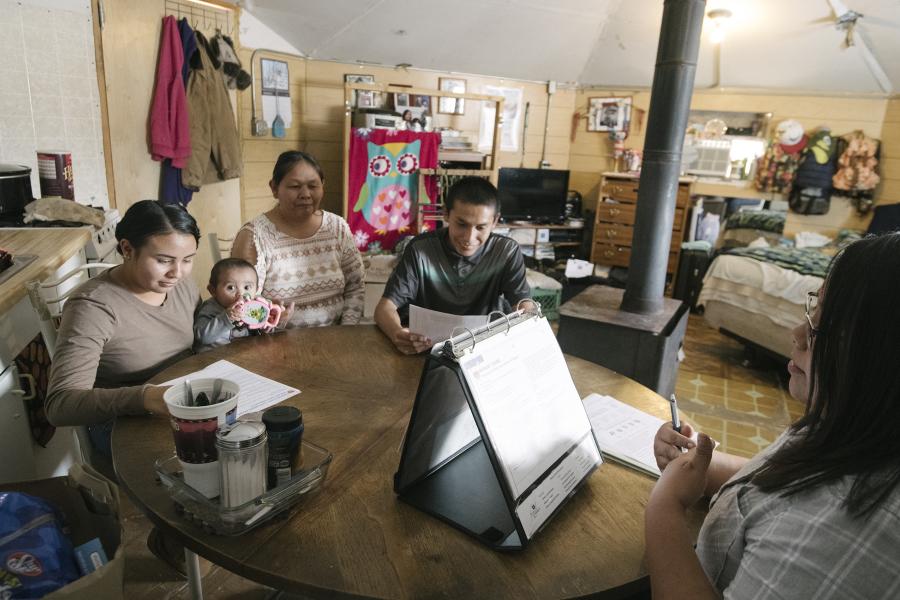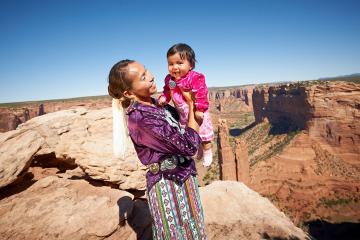- Name
- Barbara Benham
- bbenham1@jhu.edu
The Johns Hopkins Center for Indigenous Health has been awarded $27.8 million by the LEGO Foundation through its Build a World of Play Challenge for the center's Family Spirit home-visiting program. The center is based at the Johns Hopkins Bloomberg School of Public Health.
The center is one of five LEGO Foundation Build a Better World of Play Challenge awardees announced earlier today. The five LEGO Foundation awards totaling 900 million Danish Kroner—approximately $117 million—will support organizations that make substantial contributions to the lives of children from birth to six years old.
The center will use the award to expand its evidence-based, culturally-centered maternal and child health program, Family Spirit. The five-year initiative—Reclaiming Indigenous Children's Futures through Home-Visiting and Intergenerational Playspaces—will open 20 new Family Spirit program sites, each serving local Indigenous communities. The home-visiting initiative will also develop intergenerational outdoor playspaces in Indigenous communities in the U.S., Canada, Australia, and New Zealand that promote traditional family parenting, nature-based recreation, and cultural teachings.
"The LEGO Foundation's visionary challenge grant will enable us to empower Indigenous communities to reclaim strong family networks through Indigenous-led parent education and intergenerational playspaces for early childhood learning and positive cultural identity development," says Allison Barlow, executive director of the Center for Indigenous Health and senior scientist in the Bloomberg School's Department of International Health.
The center's Family Spirit home-visiting program got its start in 1995 when the center partnered with Navajo, White Mountain Apache, and San Carlos tribal communities in the U.S. to support mothers and young children with home-visiting by local family health coaches. The home visits promoted healthy child development as well as maternal health and well-being. Family Spirit has now been used in 155 communities in 24 U.S. states.
To assess the impact of Family Spirit, the center and Indigenous researchers conducted several randomized control trials. Their peer-reviewed studies, published between 2006 and 2015, found the home-visiting program demonstrated significant impact on maternal substance use, depression, behavioral problems, and children's social, emotional, and behavioral development that predict greater well-being across the life course.
The LEGO Foundation selected the center and four other winners from a pool of 627 applicants from 86 countries. The center was named one of 10 preliminary finalists in October, when it received a $1 million grant to develop its proposed plan.
The center will implement the home-visiting and playspaces programs in the U.S. and with three Indigenous organizations abroad: the First Nations Health Authority (Canada); Te R?p? Rangahau Hauora a Eru P?mare/The Eru P?mare M?ori Health at University of Otago (New Zealand), and Batchelor Institute for Indigenous Tertiary Education (Australia).
"Play is the foundation of childhood—it's what makes children special, but research has consistently shown that it's also crucial to their health and development," says Ellen J. MacKenzie, dean of the Bloomberg School. "With this incredible support from the LEGO Foundation, our Center for Indigenous Health will fully embrace the power of play and expand its vital home-visiting program, Family Spirit. We are grateful for this award and look forward to seeing its global impact."
The nature-based playspaces created through the initiative will reflect participating communities' cultural and traditional knowledges and practices. They will promote land-based early learning and deepen families' connections with local Indigenous communities, cultures, and traditional intergenerational parenting practices.
Indigenous peoples suffer among the greatest inequities in the world, resulting from generations of historical trauma caused by colonization and continued marginalization. The parent-child relationship in early life is core to children's healthy development, but Indigenous parent-child relationships are under constant threat. Many Indigenous parents today in all four participating countries were raised by caregivers affected by the traumas of residential boarding schools, which tore apart family units and sought to terminate Indigenous identities. Through this five-year initiative, the partners will promote traditional family parenting, nature-based recreational learning, and cultural teachings that reflect the Indigenous values of the community.
The center estimates that the initiative will reach over 240,000 Indigenous people. As it has done in the past, the center will rigorously evaluate the project's impact on children's developmental and physical outcomes; foster care and legal system encounters; as well as measures of family stability and cultural and community connectedness.
"Children are the embodiment of our hope, wonder, and joy. When we weave together our efforts—as educators, public health advocates, health care providers, parents, funders, stakeholders, and community members—we are ensuring that our children are put on the path that positively impacts the trajectory of all of our futures," says Crystal Austin, (Navajo), associate director of development at the Center for Indigenous Health.
The LEGO Foundation's Build a World of Play Challenge is managed by Lever for Change, a nonprofit affiliate of the John D. and Catherine T. MacArthur Foundation that connects donors with solutions to tackle the world's biggest problems, including issues like racial inequity, gender inequality, lack of access to economic opportunity, and climate change.
Posted in Health
Tagged center for indigenous health









